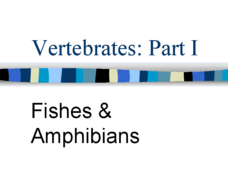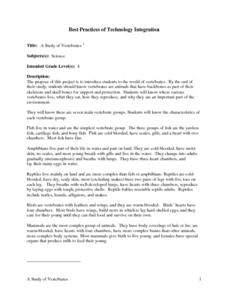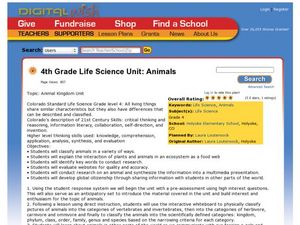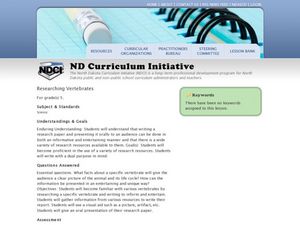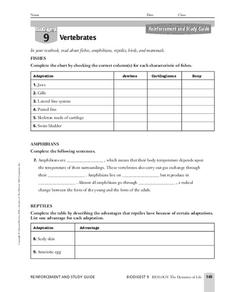NOAA
Vertebrates I
I spy a spine. The 19th installment of a 23-part NOAA Enrichment in Marine sciences and Oceanography (NEMO) program explores vertebrate species, such as sharks and other fish. Learners take part in an activity evaluating the...
Curated OER
Life Science: Living Things
Have your class build their vocabulary bank by studying life science terms. Basic terms like organism, cell, unicellular, and vertebrate are included on the definition sheet provided. Demonstrate how to identify different life science...
NOAA
Vertebrates II
Mammals of the ocean unite! Or not. The 20th installment of a 23-part NOAA Enrichment in Marine sciences and Oceanography (NEMO) program investigates how warm-blooded marine mammals survive in water. In the class activity, learners use...
Curated OER
Vertebrates: Part I, Fishes & Amphibians
A simple set of slides shares the three classes of fish and the class amphibia. The first three slides cover fish characteristics and structure, while the last three cover amphibian characteristics and life cycle. Though somewhat...
Scholastic
Study Jams! Vertebrates
Your back will be covered when you use this presentation to introduce beginning biologists to phylum chordata, the vertebrates. Five classes are defined: fish, amphibians, reptiles, birds, and mammals throughout the eight vibrant slides....
American Museum of Natural History
What do You Know About Life on Earth?
Humans have only inhabited the earth for a fraction of the time that life has existed. Young scientists explore the facts about the emergence of life on Earth with an interactive resource. While highlighting different types of life, the...
Curated OER
The Five Classes of Vertebrates
What a terrific lesson! Learners discuss the animal kingdom, and classify them as vertebrates and invertebrates. They also identify them as fish, amphibians, reptiles, birds, and mammals. There is even a taxonomic breakdown of popular...
Curated OER
Vertebrate Dioramas
Students are able to describe the development of their chosen form of vertebrate life from the past to the present in a four to six page typed paper. They explain the use of phylogenetic tree. Students use the phylogenetic tree to...
Curated OER
Life in a Forest Stream
Students assess macro-invertebrates from a stream. In this science lesson plan, students observe, classify and identify organisms found in a stream. A lab station is constructed at the stream sight and students study the different...
Columbus City Schools
Get Your Organisms Organized
From large to small, show your class how to organize them all! Included within the guide is everything you need to take their knowledge of classification from the cellular to the species level. The worksheets focus on...
Curated OER
Structure and Function of Vertebrates - Reading/Notetaking Guide - Amphibians
A variety of questions are presented on the amazing amphibian. Life science intellectuals complete a life cycle diagram, describe characteristics and behaviors, and fill in a metamorphosis flowchart. Content level is geared toward middle...
Curated OER
A Study of Vertebrates
Fourth graders investigate the characteristics of each vertebrate group. They take notes in a science journal, and in small groups create a HyperStudio slideshow presentation to present information about a specific vertebrate group.
Curated OER
Vertebrates
Young scholars identify and describe five main groups of the Phylum Chordata. They discover that the Phylum Chordata is the vertebrates. Students identify the main difference between invertebrates and vertebrates. They read passages...
Curated OER
The History of Life on Earth
Using meters as years, your class works together to map out the geologic time scale on a football field. Plenty of background information is included in this lesson plan as well as several resource links and a student worksheet. Your...
Curated OER
Oceans in Motion
This simple lesson introduces children to basic marine life as well as to show them the necessity of protecting aquatic environments. Some famous marine life animals are introduced via vocabulary words, then children cut out pictures of...
American Museum of Natural History
The Tree of Life
Groups of species can have more in common than meets the eye. An interactive cladogram shows some of the connections between important groups of species. Learners click on sections of the diagram to learn more about the connections or on...
Curated OER
Connecticut Wildlife: Biodiversity and Conservation Status of Our Vertebrate Populations
Students explore the different types of vertebrates found in their area. In this environmental science activity, students perform a case study on the Common Raven. They analyze data collected from research and create charts and graphs.
Curated OER
Week 8 - Sea Life
Using a magnifier, mini marine biologists examine the barbules of a bird feather. They swirl the it into a mixture of oil and water and then re-examine the feather. After the activity, discuss how the oily feathers pose a problem to...
Curated OER
4th Grade Life Science Unit: Animals
Fourth graders classify animals. In this animal kingdom lesson, 4th graders research animal habitats and behaviors. Students connect to a zoologist via SKYPE and learn about animal classification. Students blog about preserving animal...
Curated OER
Vertebrate Classification Challenge
Students determine which animals belong to the vertebrate phyla. In this classification lesson, students are given large papers with the names of the phyla of vertebrates. They must work together to place organisms into their...
Curated OER
Researching Vertebrates
Fifth graders research and present a paper about vertebrates. In this research and writing lesson, 5th graders research information about vertebrates which they include in a paper and presentation. They determine how to present relevant...
Curated OER
Vertebrates
In this vertebrate learning exercise, students review the different adaptations for the 5 groups of vertebrates: birds, mammals, reptiles, amphibians, and fishes. This learning exercise has 12 matching, 1 fill in the blank, and 7 short...
Curated OER
Diversity of Modern Life
Convey classification to your amateur biologists with this bright and bold presentation. After you introduce each kingdom, query your viewers with the included reinforcement questions. Since there are no photos of the different...
Curated OER
Vertebrate Dioramas
Students describe the development of their chosen form of vertebrate life from the past to the present in a four to six page paper. They explain the use of a phylogenetic tree, and use this to exemplify an organism's evolutionary change...





